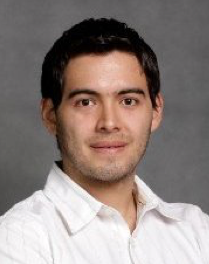
NRGI Regional Extractive Industries Knowledge Hub Alumni Stories: Transforming Extractive Industries for Development in Ecuador
Juan José Herrera works for the Extractive Industries Program at Grupo Faro, based in Ecuador. In 2011, he attended the Latin America Regional Extractive Industries Knowledge Hub. In 2012, he attended the advanced course at the Central European University in Budapest.
Juan José Herrera works with the extractives industries program at Grupo Faro on issues in oil, gas and mining transparency. Colleagues who had previously taken part in a regional knowledge hub course run by NRGI and Pontificia Universidad Católica del Perú in Lima suggested he participate.
In Herrera’s native Ecuador, courses that focus on resource revenue and contracts don’t exist, he said. Herrera said that the training’s uniqueness and clear alignment with his work at Grupo Faro encouraged him to apply.
 Name: Organization: Course attended: Latin America Knowledge Hub Diploma Course 2012, Advanced Course 2013 |
|
Ecuador's economy is highly dependent on the extractive industries, which made up 20 percent of gross domestic product in 2011 and 58 percent of exports. Recent reforms to the Hydrocarbon Law required foreign companies to renegotiate their arrangements with the government. Fourteen companies have signed new contracts; others left the country, resulting in a drop in output. Nevertheless, Ecuador remains the fifth-largest petroleum producer in Central and South America. |
The course introduced him to topics such as contract negotiation, revenue generation and management, and environmental conflict. He met and discussed the subject with people from all over Latin America. He maintains contact with fellow participants and has engaged in collaborative research with some of them.
Hererra produced a NRGI-supported report on the management of Ecuador’s oil revenues and how best to monitor them. The report had a lot of impact in Ecuador, as the revenue information is difficult to access. As a result, there are not many institutions producing this kind of research.
From 2012 to 2013, Herrera said, Ecuador focused its efforts on moving toward large-scale mining, spurring legislative action. The country also signed its first large-scale mining contract in this period. Grupo Faro spent a year analyzing the contract. Hererra applied his course training here.
He is now working on an ELLA Learning Alliance, an online learning platform seeking to bring together actors from Latin America and Africa to discuss certain topics. Hererra worked with hub course participants to develop the content for this platform. This included engaging other alumni on research publish on the site. Hub course faculty also held seminars with members of the alliance.
The Latin America Regional Extractive Industries Knowledge Hub is an NRGI-Pontificia Universidad Católica del Perú partnership intended to build capacity in Latin America to shape oil, gas and mining governance. For more information on hub offerings, visit the hub page on NRGI’s website. The hub is one of six NRGI created in partnership with academic institutions to offer training and support for civil society organizations, members of parliament and journalists in Anglophone Africa, Francophone Africa, Asia-Pacific, Eurasia, Latin America and the Middle East and North Africa.